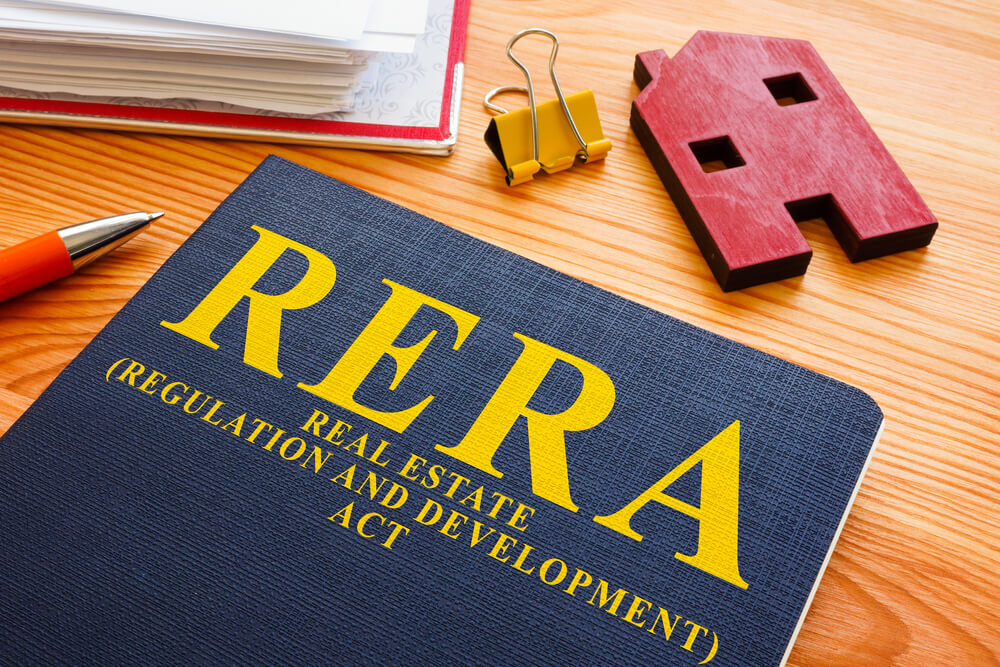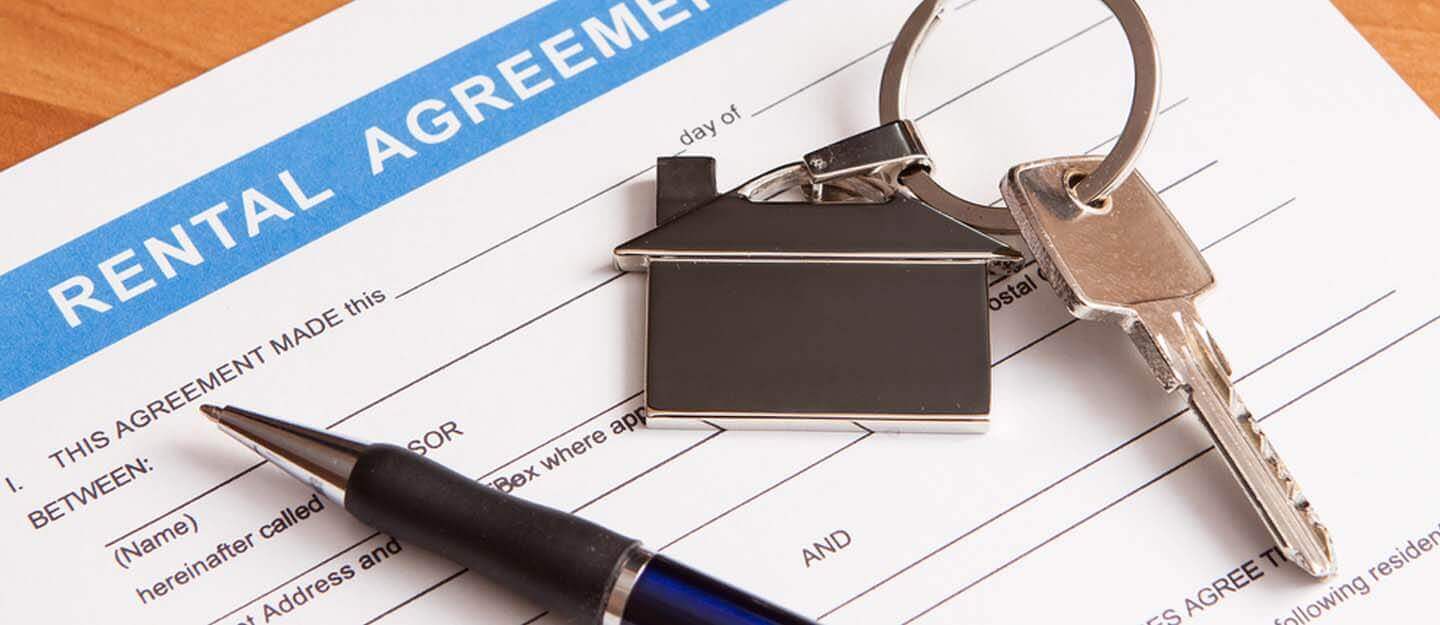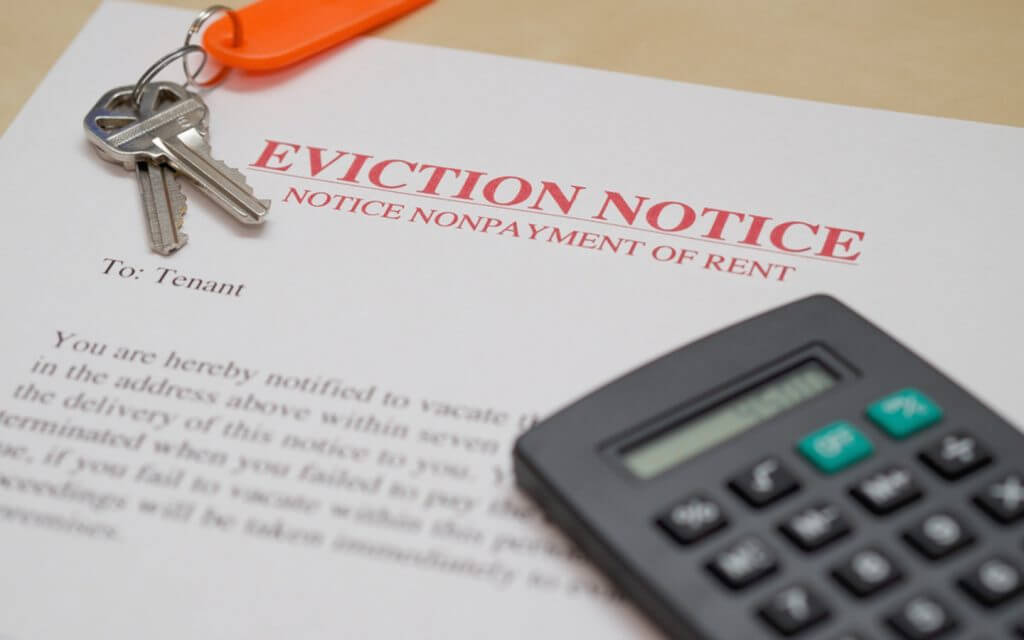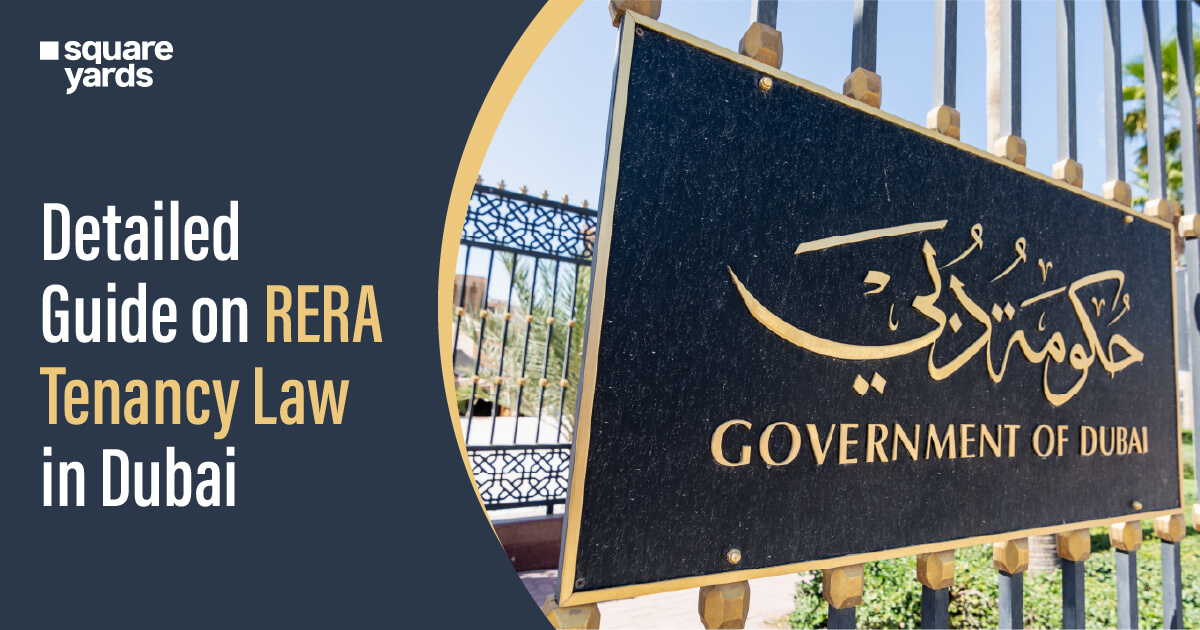The Real Estate Regulation Agency, popularly known as RERA, is a regulatory framework for Dubai Tenancy laws. They control and handle tenants’ powers to exercise and obligations to comply with. In simpler terms, the RERA laws establish authoritative regulations to address the association between the tenant and landlord. This summarises each person’s roles and obligations to reduce conflicts and misunderstandings.
This blog will delve into various facets of RERA rules, including the rental increase law in Dubai, RERA rent calculator Dubai, contract termination, and more.
RERA Laws Governing Tenancy Contracts in Dubai

Law No. (26) of 2007 serves as Dubai’s primary RERA tenancy law, governing the relationship between the landlord and tenant.
According to Article 6 of RERA’s Tenancy Law No. (26) of 2007, the law will extend the duration of tenancy immediately for the same term or one year (whichever is less). This is on the identical provisions of service if the property tenancy deal lapses and the tenant continues to reside in the property without the landlord’s reluctance.
All tenants or property owners must register the tenancy agreement with the Real Estate Regulatory Agency (RERA) through Ejari as per Article 4 of Law No. (33) of 2008. The law prevents leasing the property to two or more parties simultaneously. Further, Law No. (33) of 2008 also states the rules and regulations regarding the registration of the RERA Dubai tenancy contract.
According to Decree No. (26) of 2013, transferring land ownership to a new owner will not influence the tenant’s ability to inhabit the Dubai property. The decree also established the Rental Disputes Settlement Centre (RDC) to resolve any dispute between the landlord and the tenant.
On the other hand, Decree No. (43) of the 2013 RERA rental agreement in Dubai defines the rental increase laws in Dubai and specifies that no increment is permitted if the current rent remains up to 10 percent lower than the rent for similar rental units in the same area.
Terms of The RERA Tenancy Laws in Dubai
Below are some important terms and provisions of Dubai rent law according to the Real Estate Regulation Agency (RERA).
- Tenants are responsible for keeping the property in good and livable condition as when they signed the RERA Dubai tenancy contract. However, the landlord can overlook minor damage that wasn’t the tenant’s fault.
- RERA tenancy law allows the tenant to request significant adjustments to make the property livable. Unless there is a written agreement between the lessee and owner, the tenant is not required to conduct any repair job or bear any expenses.
- Unless there is a conflicting deal among the parties, landlords must maintain and repair the building while the tenant occupies it.
- As per Article 6 of Law No. (26) of 2007, if a tenant stays after the contract expires without the landlord’s objections, the RERA Dubai tenancy contract will automatically extend. The extension will be for the same period, or one year, whichever is shorter, under the same terms and conditions.
- RERA tenancy contract rules instruct landlords to ensure their properties are livable and conducive. However, as mentioned in Article 15 of Law No. (26) of 2007, the renters are permitted to accept an unfinished property and complete it, making them responsible for the expenditure.
- As per Article 17 of Law No. (26) of 2007, the landlord has no authority to refurbish the rental property in any way that would interfere with the tenant’s ability to use it completely. Nevertheless, the renovation might start after the renter consents to the landlord’s attempts.
- According to Article 19 of Law No. (26) of 2007, every tenant renting a property in Dubai must get approval from the landlord. This should be done before making any modifications to the property. Also, they must obtain a lawful license if it involves any statutory provisions related to rental property laws.
- Article 20 of Law No. (26) of 2007 allows tenants to settle any damages from the security deposit. The tenant can also approach RERA regarding disputes related to the non-refund of the security deposit.
- As per Article 28 of Law No. (26) of 2007, a tenant can reside amid a transfer of property ownership.
Amending The Terms of The Contract
As per the Law No. (26) of 2007, RERA is a regulatory body that deals with the tenancy rules and regulations in Dubai. Moreover, except for hotel lodgings and property provided to workers free of charge by their organisations, this law applies to all rented properties inside Dubai.
Article 14 mandates that the landlord or tenant notify the other party of amendments to the tenancy contract at least 90 days before its expiration.
A RERA Dubai tenancy contract remains valid for the specified period until the rent is paid.
According to the Dubai tenancy contract renewal rules, the lease duration must be clearly stated in the agreement. If the landlord agrees, the tenant can extend the lease for an additional year or the same duration as the original. However, both parties must mutually agree to the proposed changes.
Terminating Tenancy Contract in Dubai

The new rental laws in Dubai specify that valid rental contracts cannot be terminated unilaterally by the landlord or the tenant. The mutual agreement of both parties is necessary for the termination of the rental contract.
If the landlord dies, Article 24 of Law No. (26) of 2007 states that instead of terminating, the contract will be passed on to the heir(s). This will remain valid until they terminate it. If the heir(s) opts to terminate the contract, a notice must be given of 30 days or the number of days left until the contract’s expiry.
Further, the Dubai tenancy law early termination highlights that a tenant must opt for early termination in due compliance with the law. The landlord might otherwise be eligible to demand compensation.
A landlord may also serve an eviction notice if a tenant uses the property for purposes other than those specified in the lease.
Rent Increase Law in Dubai
If the property owner plans to increase the rent for the next term, they can do so after complying with the rental increase law in Dubai. As per the law, a landlord must give a 90-day notice to the lessee before reviving the agreement. On the other hand, the tenant can agree to the rental increase or reject it. They have to provide the lessor 60 days’ notification. Moreover, they must do so before the rental agreement date to leave the rental property.
Article 9 of Law No. (26) of 2007 mandates both parties to specify a mutually acceptable rental value. They cannot increase until two years after the original contract date.
Decree No. (43) of 2013 caps the rental increase to 20% in Dubai. Different rent increase caps are levied on different properties depending upon their current rental value. For example, the law prohibits a rent increase. This is the case if the current rent of a property is within 10% of the average rent. However, a 5% increase is permitted if the current rent falls between 11% and 20%.
If the two parties cannot reach a mutual agreement or the tenant wishes to challenge an unfair rental hike, a case can be filed at the Rent Disputes Settlement Centre. Further, under Article 10 of Law No. (26) of 2007, RERA holds the sole authority to regulate the rental increase law in Dubai.
Dubai Land Department’s (DLD’s) official website offers a modern RERA rent calculator in Dubai. Tenants and landlords can use the calculator to determine the rent hike for which they are eligible.
General Obligations of Tenants in Dubai
Here are some general obligations tenants must follow according to Dubai tenancy laws.
- Article 19: The tenant must pay the property rent on the due date. Further, the law does not allow changes, maintenance, or repair to the property without the landlord’s permission.
- Article 21: Upon the expiry of the tenancy contract, the tenant must relinquish possession of the rental property to the landlord without any physical damage. Also, in case of any disputes related to Dubai tenancy contract renewal rules, the issue must be reported to the tribunal.
- Article 22: Unless the tenancy contract specifies the opposite, the tenant must pay all expenses and state taxes due to government institutions and divisions for using the property.
- Article 23: Tenants must not remove any improvements when vacating the property unless agreed otherwise by the landlord.
General Obligations of Landlords in Dubai

Here are some general obligations landlords must follow according to Dubai tenancy laws.
-
- Article 15: The landlord remains accountable for offering the property to the tenant in a livable condition and letting the tenant fully utilise the rental property as stated in the contract.
- Article 16: Unless otherwise decided by the tenant and the landlord, the landlord will remain liable for the property’s supervision works and for fixing any physical damage for the full contract period.
- Article 17: The landlord must not alter the leased property directly or indirectly in a way that would obstruct or limit the tenant’s ability to use it as intended.
- Article 18: The landlord must supply the tenant with the necessary official permits and licenses. This is to conduct any construction or redecoration on the property, when applicable.
Vacating Notice To The Landlord
The landlord may issue an eviction notice if the renters seriously damage or utilize the property for illegal purposes. In addition, according to Law No. (33) of 2008, the tenant is not obligated to serve any prior intimation. This is for vacating the property upon the contract expiry.
Nevertheless, the landlord gives precedence to the tenancy provisions. This may demand a detailed notice period in the case of non-renewal of the rental agreement. Moreover, when vacating a rental property, the landlord must refund the tenant’s security deposit. They can do it in full or the remaining balance after making the required deductions.
Tenancy Law in Dubai Regarding Evictions

New rental law in Dubai allows evictions under the following circumstances:
-
Before the Expiry of the Tenancy Contract
Article 25 of Law No. (26) of 2007, amended by by Law No. (33) highlights the following.
A landlord can evict a tenant before the expiry of the rental contract if the tenant:
-
- Does not pay rent within 30 days after receiving a written notice from the landlord.
- Alters, damages, or encourages the damage of the property in a way that compromises safety.
- Subleases the property without the landlord’s written consent.
- Indulges in immoral or illegal activities during their stay.
- Uses the property for purposes other than what was specified in the lease agreement.
- Fails to comply with any of the lease terms despite 30 days of receiving a written notice from the landlord.
- Ceases operations for 30 consecutive or 90 non-consecutive days without valid justification (applicable to commercial properties).
- The law requires eviction if a government authority mandates demolishing the property for urban development.
-
Upon Expiry of The Tenancy Contract
The landlord can seek a tenant’s eviction upon the contract’s completion. The landlord must give a 12-month written notice by registered mail or public notary to the tenant in such cases. The contract may end if:
-
- The landlord intends to rebuild or tear down the property.
- The property needs extensive repairs or renovations while the tenant remains in residence.
- The landlord plans to put the property up for sale.
- The landlord seeks to occupy the property for personal use or immediate family members.
Dispute Resolutions
RERA Tenancy Law allows landlords and tenants to register a formal complaint with DLD’s Rent Disputes Settlement Centre in case of disagreement. Plaintiffs must promptly report concerns like miscommunication, illegal eviction, and rent delays.
The Bottom Line
Law No. (26) of 2007, along with others, primarily governs tenancy laws in Dubai. Whether tenants lease apartments or villas in Dubai, they must know the RERA tenancy law. From rent increases to contract expiry, it specifies complete details regarding various aspects. Further, tools like the RERA Rent Calculator Dubai simplify navigating rental hikes. The new rental laws in Dubai benefit tenants and landlords, ensuring a hassle-free rental experience.
Recommended for you :
| Renting a Commercial Space in Dubai | Guide To Renting a Commercial Space in Dubai |
| Real Estate Laws in Dubai | Know About Real Estate Laws in Dubai |
| New UAE Labour Law 2022 | What is The New UAE Labour Law 2022 |
| New Bounced Cheque Law in UAE | All About New Bounced Cheque Law in UAE |
Frequently Asked Question (FAQs)
As per the new rental law in Dubai, tenants are entitled to extend their leases if they notify their landlord 90 days before the lease expires. Also, as long as the landlord gives the required notice period and the tenant is not removed, the tenant has the right to remain in the rented property.
The RERA tenancy law requires the landlord to issue a notice to the tenant and inform the basis for eviction at least twelve months before the scheduled eviction date. This should be done via a Notary Public or certified mail.
Evicting a tenant in Dubai can take around 30 days if the tenant violates the lease terms. It may also extend to 12 months if the eviction is due to reasons like property sale or major renovations.
Dubai tenancy law for early termination requires tenants to follow due legal compliance while terminating. Any non-compliance can invite compensation demands from the landlord.
According to new renal law in Dubai, a landlord must give a 12-month notice of eviction if the eviction is due to reasons such as property sale, personal use, or major renovations. In other cases, the eviction notice can be much shorter.
The rental increase law in Dubai allows landlords to raise the rent of a property as long as a 90-day notice is given before the lease’s expiry. However, the landlord can only increase the rent up to the restrictions set under the RERA tenancy law.
As per a new draft law, all new rental leases in Dubai would remain subject to the three-year no-increment cap. However, this proposal has not been implemented yet.
As per Decree No. (43) of 2013, no rent increase is allowed if the current rent is within 10% of the property’s market average. A 5% increase is allowed if it's 11-20% below, with the maximum increase capped at 20%.
If any tenant fails to pay rent on time, the landlord can send a 30-day notice to settle the same. However, if the tenant still fails to pay the rent, the landlord can file a complaint with the Rental Disputes Settlement Centre (RDSC).
Yes, a landlord can ask a tenant to vacate the property by giving a due 12-month written notice through a notary public or registered mail. Further, the reasons for eviction must also align with the RERA tenancy law.
A landlord or tenant can use the RERA rent calculator Dubai on the official DLD website to check the rent increase for which they are eligible. What are the rights of tenants in Dubai?
What is the duration of the notice given by the landlord to a tenant upon eviction?
How long does it take to evict a tenant in Dubai?
Can I terminate the tenancy agreement early in Dubai?
How long Is the notice period for tenants in Dubai?
Can the landlord Increase rent in Dubai after one year?
Is Dubai rent fixed for three years?
What Is the maximum increase allowed under the rental increase law in Dubai?
What happens if you don’t pay rent in Dubai?
Can a landlord ask a tenant to move out in Dubai?
How can I check the rent increase I am eligible for?




